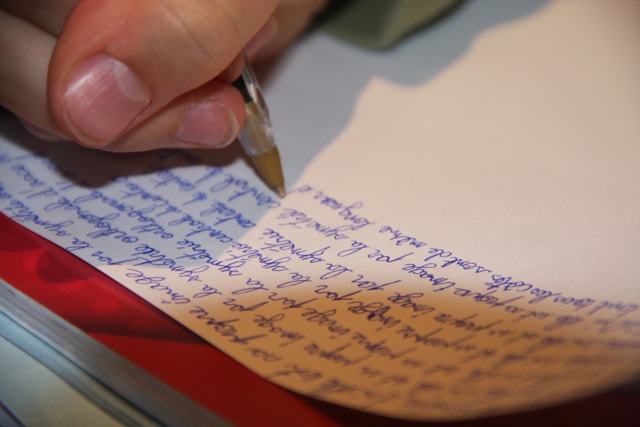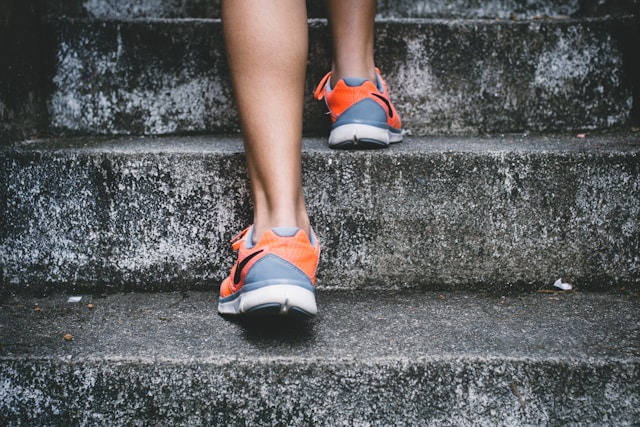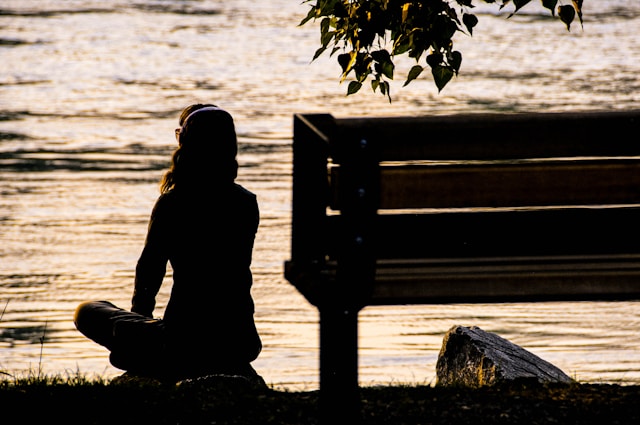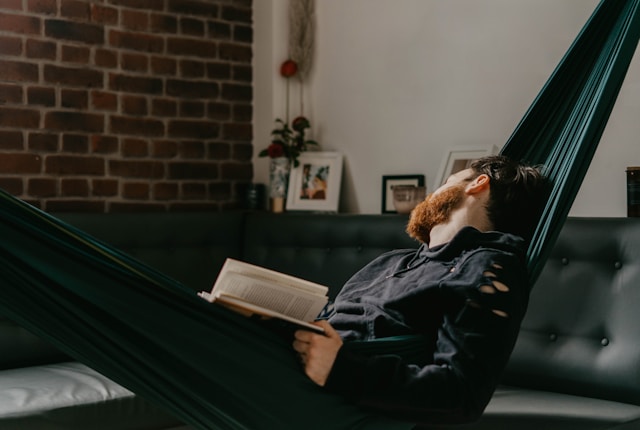Anxiety is one of the most common mental health challenges people face today. It can range in severity from person to person. Some experience it consistently, while others notice flare-ups triggered by specific life events or stressors. The racing thoughts, the physical tension, the constant worry about things that haven’t even happened yet … it can feel exhausting and overwhelming.
The good news? You can learn to manage your anxiety more effectively, both through professional counseling and by building daily habits for anxiety relief. While therapy provides essential tools and support, the small actions you take every day can make a significant difference in how manageable your symptoms feel.
Rebecca Dorich, Licensed Clinical Professional Counselor (LCPC) and clinical supervisor who specializes in anxiety treatment, emphasizes an important principle about building sustainable change:
“The true power of daily habits lies in their consistency, not their intensity. We focus on building small, intentional routines that rewire the nervous system over time, moving you from a state of chronic fight-or-flight to one of grounded presence.”
With her training in Cognitive Behavioral Therapy (CBT), Exposure and Response Prevention (ERP), and Acceptance and Commitment Therapy (ACT), Rebecca helps clients understand that lasting anxiety relief comes not from dramatic interventions, but from small, consistent actions repeated over time
Research supports this approach. Studies have shown that regular practice of anxiety coping skills (even simple ones) can actually change how your brain responds to stress over time. These aren’t quick fixes, but rather building blocks that create a foundation of resilience and calm.
Feeling overwhelmed by anxiety?
Our experienced therapists in Park Ridge and Willowbrook specialize in teaching practical anxiety coping skills that you can use every day to feel calmer and more in control.
Here are 10 evidence-based daily habits that can help you manage anxiety symptoms and feel more in control of your life again.
1. Talk to Someone
One of the most powerful anxiety coping skills for our clients in Willowbrook, IL and beyond is simply talking about what you’re experiencing. While seeing a therapist provides professional guidance and evidence-based tools, sharing your struggles with trusted friends or family members can also help you manage symptoms day to day.
You don’t have to suffer in silence. In fact, keeping anxiety a secret often makes it worse. When we feel ashamed of our anxiety and try to hide it, it tends to grow larger and take up more mental space.
Here’s what happens when you open up about anxiety:
- You realize you’re not alone and that actually many people struggle with similar worries
- The thoughts lose some of their power when spoken out loud
- Others can offer support, perspective, or simply listen without judgment
- You stop expending energy trying to hide how you’re feeling
You don’t need to share with everyone, but having at least one or two people who know what you’re dealing with can make a significant difference. Often, you’ll find that others are struggling too, which helps normalize the experience and reduces shame.
2. Exercise Daily
Physical activity is one of the most well-researched daily habits for anxiety relief. Exercise doesn’t just benefit your physical health; it has powerful effects on mental health as well.
Physical activity is one of the most well-researched daily habits for anxiety relief. Exercise doesn’t just benefit your physical health; it has powerful effects on mental health as well. A comprehensive 2023 study published in AJPM Focus examined dozens of research reviews and found that people with high levels of physical activity had significantly lower odds of developing anxiety compared to those with low activity levels. The researchers assessed this relationship as “probably causal,” meaning regular physical activity likely helps prevent anxiety from developing in the first place.
The anxiety-reducing benefits of exercise include:
- Immediate reduction in anxious feelings (often within minutes of starting)
- Better sleep quality, which in turn helps manage anxiety
- Improved ability to handle stress throughout the day
- Increased confidence and sense of accomplishment
- Distraction from anxious thoughts and worry loops
You don’t need to run marathons or spend hours at the gym. Even moderate exercise, like a 20 to 30 minute walk, a bike ride, or a yoga session, can make a noticeable difference in your anxiety levels.
The key is consistency. Daily movement, even in small amounts, is more beneficial than occasional intense workouts.
3. Practice Mindfulness
Anxiety has a way of pulling your mind away from the present moment. You might find yourself ruminating about past mistakes or worrying about future what-ifs. Mindfulness is the practice of gently bringing your attention back to right now.
Mindfulness helps with anxiety by:
- Interrupting worry spirals before they escalate
- Teaching you to observe anxious thoughts without getting caught up in them
- Grounding you in your physical body and immediate surroundings
- Creating space between a trigger and your response
You don’t need to meditate for hours or achieve a perfectly calm mind. Even spending just a few minutes each day practicing mindfulness (focusing on your breath, noticing sensations in your body, or simply observing your surroundings without judgment) can prevent anxious thoughts from taking over.
Simple mindfulness practices include:
- Taking three deep breaths and noticing how your body feels
- Eating a meal slowly and paying attention to the taste and texture
- Spending a few minutes observing your surroundings with curiosity
- Doing a brief body scan, noticing any areas of tension or comfort
4. Practice Gratitude
When anxiety dominates your thinking, it’s easy to focus exclusively on threats, problems, and everything that could go wrong. Practicing gratitude helps balance this negativity bias by intentionally directing your attention toward what’s going well in your life.
Gratitude isn’t about toxic positivity or pretending problems don’t exist. Rather, it’s about acknowledging that even when things are difficult, there are often still aspects of life worth appreciating.
Research shows that regular gratitude practice can:
- Reduce symptoms of anxiety and depression
- Improve sleep quality
- Increase resilience during stressful times
- Shift your brain’s focus away from threats and toward positive aspects of life
Ways to practice daily gratitude:
- Write down three specific things you’re grateful for each morning or evening
- Share something you appreciate with a loved one
- Notice small moments of beauty or kindness throughout your day
- Reflect on a challenge you’ve overcome and what it taught you
The key is specificity. Rather than vague gratitude (“I’m grateful for my family”), try to identify particular moments (“I’m grateful my sister texted to check in on me today”).
Research shows that practicing gratitude, specifically dedicating 15 minutes a day, five days a week, for at least six weeks, can enhance mental wellness and possibly promote a lasting change in perspective. In a rigorous study published in the Journal of Happiness Studies and reported on by UCLA Health, researchers followed 217 adults with low to moderate well-being and moderate symptoms of depression and anxiety through a six-week gratitude intervention. The results were striking: participants who practiced gratitude experienced significant improvements in mental well-being compared to both those who practiced self-kindness activities and those on a waitlist, with benefits lasting up to six months after the intervention ended.

5. Start a Journal
Writing down your thoughts and feelings is one of the most effective anxiety coping skills, and it’s something you can do entirely on your own. Journaling helps you process anxious thoughts by getting them out of your head and onto paper, where they often feel less overwhelming.
Benefits of journaling for anxiety:
- Anxious thoughts lose some of their power when you see them written down
- You can identify patterns in what triggers your anxiety
- Writing provides an outlet for worries without judgment
- You can track your progress over time and see how far you’ve come
- It creates distance between you and your anxious thoughts
Types of journaling that help with anxiety:
- Stream of consciousness: Write whatever comes to mind for 10 to 15 minutes without editing
- Worry journaling: Designate a specific “worry time” each day to write down concerns, then consciously set them aside
- Gratitude journaling: Focus specifically on positive aspects of your day
- Thought challenging: Write down anxious thoughts, then examine evidence for and against them
You don’t need to write pages and pages. Even a few sentences each day can make a difference.
6. Practice Good Sleep Hygiene
The relationship between sleep and anxiety is bidirectional. Anxiety can make it hard to sleep, and lack of sleep makes anxiety worse. Establishing healthy sleep habits is crucial for managing anxiety symptoms.
Research published in AIMS Neuroscience helps explain why: after sleep deprivation, the brain’s emotional regulation system essentially breaks down. The areas responsible for processing threats become overactive, while the prefrontal cortex (the part of your brain that helps you think rationally and manage emotions) becomes less active. This is particularly true following REM sleep deprivation, which leads to heightened emotional irritability and reactivity.
In practical terms, this means that when you’re sleep-deprived, you’re literally less equipped to handle anxious thoughts and feelings. Your brain’s alarm system is on high alert while your ability to calm yourself down is compromised.
Good sleep hygiene habits include:
- Going to bed and waking up at consistent times, even on weekends
- Creating a relaxing bedtime routine (reading, gentle stretching, calming music)
- Avoiding screens for at least an hour before bed (blue light suppresses melatonin)
- Keeping your bedroom cool, dark, and quiet
- Avoiding caffeine after early afternoon and alcohol before bed
- Getting morning sunlight exposure to regulate your circadian rhythm
If anxiety makes it hard to fall asleep, try the “worry postponement” technique: keep a notepad by your bed and write down any worries that pop up, telling yourself you’ll address them tomorrow. This helps your brain let go of the thoughts for now.
7. Treat Yourself with Kindness
Self-care isn’t just a buzzword; it’s an essential component of managing anxiety. Small acts of kindness toward yourself throughout the day can interrupt anxious thinking and remind you that you deserve care and comfort.
Self-care for anxiety doesn’t have to be elaborate or expensive. It’s about recognizing what brings you small moments of peace, pleasure, or comfort, and intentionally incorporating those things into your daily life.
Examples of small daily self-care acts:
- Picking up your favorite coffee or treating yourself to a pastry
- Taking a few minutes to sit outside and enjoy fresh air
- Listening to music that lifts your mood
- Taking a warm shower or bath with pleasant-smelling products
- Wearing clothes that feel comfortable and make you feel good
- Calling a friend just to chat
- Giving yourself permission to rest when you’re tired
These might seem small, but they send an important message to yourself: “I matter. My comfort and well-being are important.” This counteracts the self-criticism and harsh judgment that often accompany anxiety.
8. Limit Your Social Media Intake
Social media can be a significant anxiety trigger for many people. Whether it’s comparing yourself to others’ carefully curated lives, encountering upsetting news, or feeling pressure to engage constantly, social media often leaves us feeling more anxious rather than less.
Ways social media can increase anxiety:
- Constant exposure to negative news and upsetting content
- Social comparison that leaves you feeling inadequate
- FOMO (fear of missing out) when seeing others’ activities
- Sleep disruption from late-night scrolling
- Information overload and difficulty focusing
- Pressure to present a perfect image of your own life
You don’t necessarily need to quit social media entirely, but monitoring and limiting your use can significantly reduce anxiety.
Strategies for healthier social media use:
- Set specific times to check social media rather than constantly scrolling
- Use apps that track and limit your screen time
- Turn off notifications so you’re not constantly pulled back to your device
- Unfollow or mute accounts that consistently make you feel worse
- Avoid checking social media first thing in the morning or right before bed
- Designate “phone-free” times or zones in your home
Notice how you feel after spending time on social media. If you consistently feel more anxious, drained, or inadequate afterward, that’s important information about what serves your mental health and what doesn’t.
9. Keep Things Neat and Clean
This might not seem like an obvious anxiety management strategy, but there’s actually a strong connection between your physical environment and your mental state.
Decluttering and maintaining an organized space can help reduce anxiety in two important ways:
First, it grounds you in the present moment. When you’re picking things up, washing dishes, or organizing a drawer, you’re focused on real, concrete tasks rather than the imaginary catastrophes your anxiety creates. This brings you out of your head and into your actual life.
Second, it reduces cognitive load. Clutter is visually distracting and can create a low-level sense of chaos that mirrors and amplifies internal anxiety. When your environment is organized, it’s one less thing your brain needs to track and worry about.
Research has found that people who describe their homes as cluttered or unfinished are more likely to experience depression and anxiety. The physical disorder in your space can contribute to a sense of being overwhelmed and out of control.
Simple habits to maintain order:
- Make your bed each morning (starts the day with a sense of accomplishment)
- Do a quick 10-minute tidy before bed
- Put things away immediately rather than letting them pile up
- Keep surfaces clear of clutter
- Create designated spaces for items you use daily
You don’t need a perfectly magazine-worthy home. Just enough order that your space feels calm rather than chaotic can make a meaningful difference in your anxiety levels.
10. Get Outside
Spending time outdoors is remarkably beneficial for mental health. Nature exposure has been shown to reduce stress hormones, lower blood pressure, improve mood, and specifically decrease anxiety symptoms.
Research published in Frontiers in Psychology found that spending just 20 minutes in nature can significantly lower cortisol levels (your body’s primary stress hormone). Other studies have shown that time in green spaces reduces rumination, the repetitive negative thinking patterns common in anxiety.
Benefits of outdoor time for anxiety:
- Natural light helps regulate your circadian rhythm and improve sleep
- Fresh air and nature sounds have a calming effect on the nervous system
- Being in nature encourages mindfulness and present-moment awareness
- Physical activity outdoors combines the benefits of exercise with nature exposure
- Sunlight increases serotonin production, which helps regulate mood and anxiety
You don’t need to spend hours hiking in remote wilderness (though that’s great if you can!).
Even brief outdoor experiences make a difference:
- A 10-minute walk around your neighborhood
- Eating lunch outside instead of at your desk
- Sitting on your porch or balcony with morning coffee
- Gardening or tending to plants
- Walking to nearby errands instead of driving
The key is making outdoor time a regular part of your routine rather than something that only happens occasionally.
Building Habits That Last
As you can see, many simple habits can be incorporated into your daily life to reduce anxiety and help you manage symptoms more effectively. The key is to start small and build gradually.
Tips for making these habits stick:
- Start with one or two habits rather than trying to implement all ten at once. Pick the ones that resonate most with you or seem most manageable given your current circumstances.
- Be consistent rather than perfect. Doing something imperfectly every day is more valuable than doing it perfectly once in a while. If you miss a day, simply start again the next day without self-criticism.
- Track your progress. Use a simple checklist, journal, or habit-tracking app to note when you practice these habits. Seeing your consistency builds motivation.
- Notice the effects. Pay attention to how you feel on days when you practice these habits versus days when you don’t. This awareness helps reinforce the connection between your actions and your anxiety levels.
- Adjust as needed. If a particular habit isn’t working for you, modify it or try a different one. The goal is to find what genuinely helps you, not to follow someone else’s perfect routine.
When to Seek Professional Support
While these daily habits can significantly help manage anxiety, they work best when combined with professional treatment. If your anxiety is interfering with your daily life, relationships, work, or overall well-being, reaching out to a therapist who specializes in anxiety treatment can provide the additional support and tools you need.
At Life Counseling Institute in Park Ridge and Willowbrook, our therapists use evidence-based approaches like Cognitive Behavioral Therapy (CBT), Exposure and Response Prevention (ERP), and Acceptance and Commitment Therapy (ACT) to help you not just manage anxiety symptoms, but understand and overcome the underlying patterns driving them.
Consider seeking professional help if:
- Your anxiety is interfering with work, school, or relationships
- You’re avoiding important activities or places because of anxiety
- Physical symptoms (racing heart, difficulty breathing, stomach issues) are frequent or intense
- You’ve tried self-help strategies but aren’t seeing improvement
- You’re using unhealthy coping mechanisms (excessive alcohol, substance use)
- Anxiety is accompanied by depression or other mental health concerns
- You’re having thoughts of harming yourself
- Or you just feel like you could use some support; therapy doesn’t require a crisis!
Remember, seeking help is a sign of strength, not weakness. Everyone needs support sometimes, and effective treatment can help you feel significantly better.
Frequently Asked Questions About Habits for Reducing Anxiety
Q: How long does it take for daily habits to actually reduce my anxiety?
A: The timeline varies from person to person and depends on several factors including the severity of your anxiety, how consistently you practice the habits, and whether you’re also receiving professional treatment. Some people notice small improvements within a few days, particularly with habits like exercise, which can provide immediate relief. However, the deeper neurological changes that come from building consistent routines typically take several weeks to a few months. Research on habit formation suggests it takes an average of 66 days for a new behavior to become automatic. The key is consistency rather than perfection. You might notice that even on days when anxiety feels high, you’re better able to manage it after a month or two of regular practice. Remember that these habits work best as ongoing lifestyle practices rather than quick fixes. The benefits compound over time.
Q: What if I’m too anxious to start these habits? Everything feels overwhelming.
A: This is a very common concern, and it’s completely valid. When anxiety is high, even small tasks can feel impossible. If you’re feeling this way, start with literally the smallest possible version of a habit. Instead of a 30-minute walk, can you step outside for 2 minutes? Instead of journaling a full page, can you write one sentence? And instead of a complete house cleaning, can you put away five items? The goal is to break through the paralysis of overwhelm by making the task so small it feels doable. Once you’ve done that tiny version, you’ll often find it’s easier to continue. Also, if your anxiety is this high, it’s especially important to reach out for professional support. A therapist can help you develop strategies specifically for managing the overwhelm and can work with you at your current functioning level. You don’t have to do this alone, and you don’t have to do it perfectly.
Q: Are there specific times of day when these habits are most effective for anxiety?
A: While there isn’t one universally best time for all habits, certain practices are particularly helpful at specific times of day. Morning routines that include exercise, gratitude, or time outdoors can set a calmer tone for your entire day and may help prevent anxiety from building. Mindfulness or journaling can be especially helpful in the evening to process the day and prepare for restful sleep. However, the most important factor is actually consistency and fit with your lifestyle. The best time to practice a habit is whenever you’re most likely to actually do it regularly. If you’re not a morning person, don’t force yourself to wake up early for a walk; you’re less likely to maintain it. Instead, find an evening time that works. Pay attention to your own patterns: Do you experience more anxiety at certain times of day? That might be when you need these tools most. Experiment to find what timing feels sustainable and effective for you.
Q: Can I rely on just these daily habits, or do I really need therapy too?
A: This depends on the severity of your anxiety and how much it’s impacting your life. It also depends on whether you view therapy as supportive even in times that aren’t crises. For mild, situational anxiety that doesn’t significantly interfere with daily functioning, building healthy daily habits might be sufficient on their own. However, for moderate to severe anxiety (especially if it’s been persistent for a long time) professional therapy provides essential additional support that self-help strategies can’t fully replace. Here’s why: Therapists can help you identify and change the underlying thought patterns and behaviors that fuel anxiety, which is difficult to do on your own. They can teach you specific evidence-based techniques tailored to your particular type of anxiety. They provide accountability, support, and professional guidance as you work through challenges. Think of it this way: daily habits are like maintaining a healthy diet and exercise routine, while therapy is like working with a personal trainer who designs a program specifically for your needs and helps you overcome obstacles. The combination of both is typically most effective. If you’re unsure whether you need therapy, consider scheduling an initial consultation. A therapist can help you assess whether professional treatment would be beneficial for your situation.
Q: What if these habits make my anxiety worse instead of better?
A: While these habits are generally safe and helpful for most people, it’s important to pay attention to how you’re actually feeling. Occasionally, certain practices can temporarily increase anxiety in specific situations. For example, some people find that sitting quietly to practice mindfulness initially makes them more aware of anxious thoughts, which can feel uncomfortable at first. Similarly, journaling might bring up difficult emotions. If you experience increased anxiety when trying a particular habit, here are some things to consider: First, distinguish between temporary discomfort (which often happens when building new habits or processing emotions) versus practices that genuinely make things worse. Temporary discomfort often decreases with continued practice. Second, you might need to modify the practice. For example, if sitting meditation increases anxiety, try walking meditation instead. If writing about worries amplifies them, try gratitude journaling instead. Third, if multiple strategies consistently increase your anxiety, this might indicate that professional support would be helpful. A therapist can help you understand what’s happening and identify which approaches are most likely to help you specifically. Finally, if you have a trauma history, some of these practices (particularly mindfulness) should be approached carefully and ideally with professional guidance, as they can sometimes trigger trauma responses.
Ready to Build Better Habits for Managing Anxiety?
Our therapists at Life Counseling Institute in Park Ridge and Willowbrook can help you develop personalized anxiety coping skills and build daily routines that actually work for your life. We offer both in-person and telehealth counseling throughout Illinois.
You Might Also Find It Helpful to Read:
- Managing Your Anxiety by Becoming AWARE
- Relax, Nothing is Under Control: Learning to Live with Uncertainty
- Why Exercise and Relaxation Alone Won’t Cure Your Anxiety
Citations:
- Wanjau, M. N., Möller, H., Haigh, F., Milat, A., Hayek, R., Lucas, P., & Veerman, J. L. (2023). Physical activity and depression and anxiety disorders: A systematic review of reviews and assessment of causality. AJPM Focus, 2(2), 100074. https://doi.org/10.1016/j.focus.2023.100074
- Vandekerckhove, M., & Wang, Y. (2017). Emotion, emotion regulation and sleep: An intimate relationship. AIMS Neuroscience, 5(1), 1–17. https://doi.org/10.3934/Neuroscience.2018.1.1








